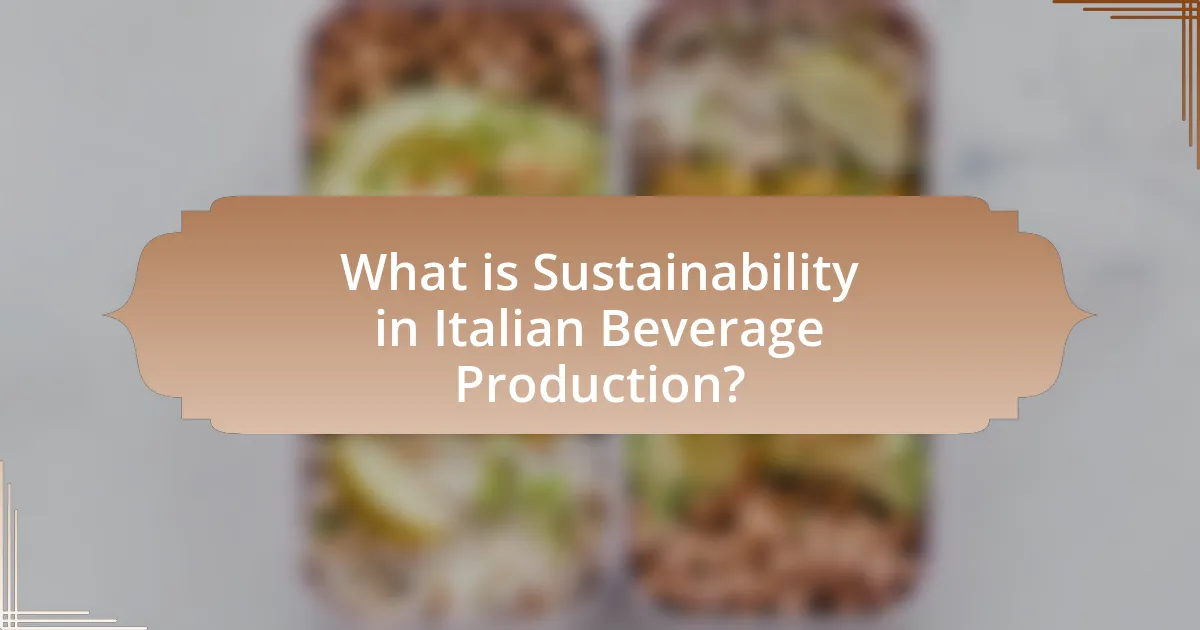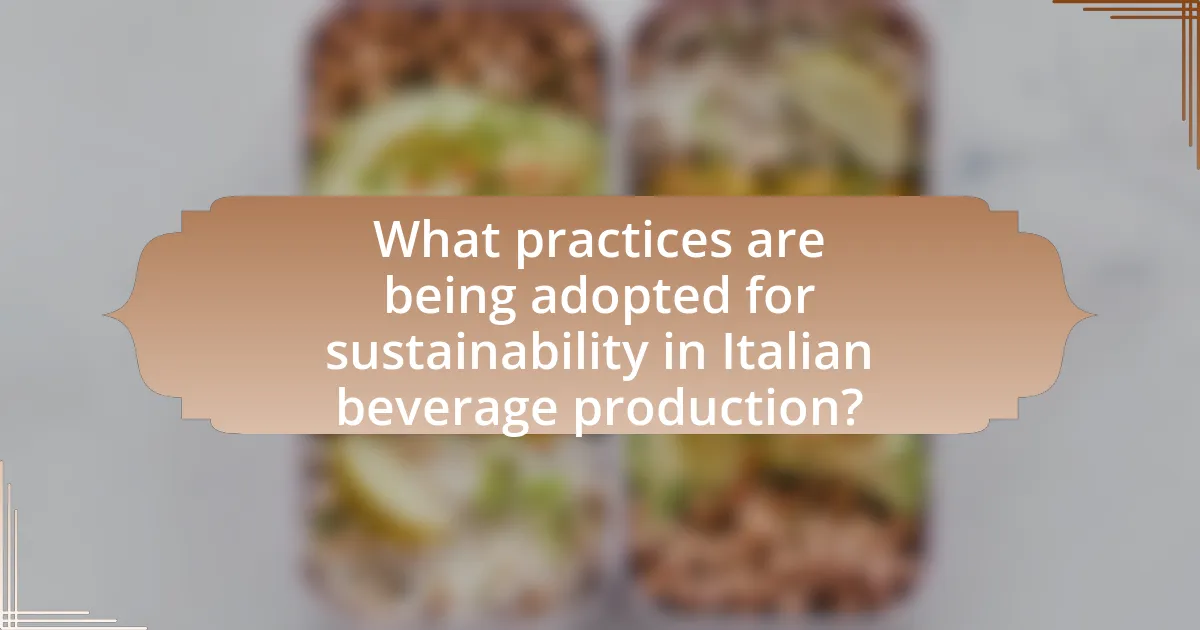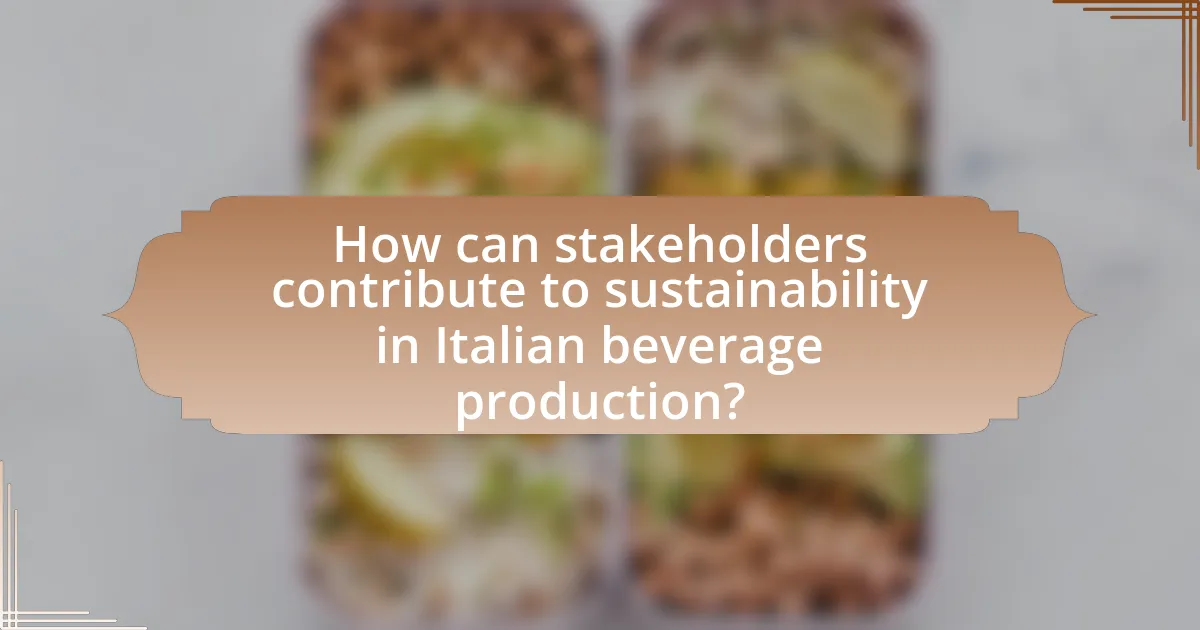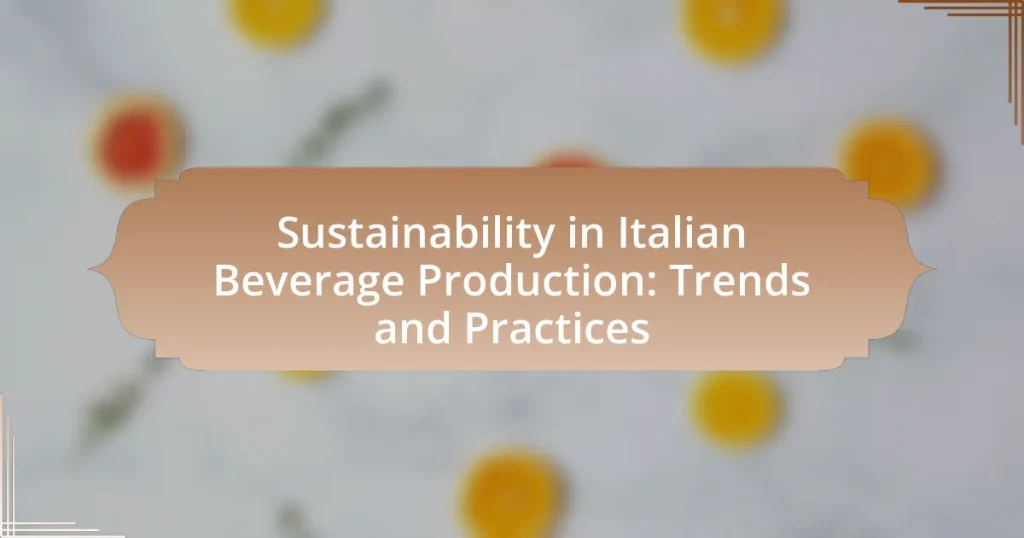Sustainability in Italian beverage production encompasses practices aimed at minimizing environmental impact while ensuring social and economic viability. This article explores the definition of sustainability within the beverage sector, highlighting key principles such as resource efficiency, waste reduction, and social responsibility. It examines current trends, including the adoption of organic farming, eco-friendly packaging, and water conservation techniques, as well as the role of consumer demand in shaping these practices. Additionally, the article addresses the challenges faced by producers in implementing sustainable methods and the economic implications of transitioning to greener production processes. Finally, it outlines practical steps for enhancing sustainability and the importance of collaboration among stakeholders in the industry.

What is Sustainability in Italian Beverage Production?
Sustainability in Italian beverage production refers to practices that minimize environmental impact while promoting social and economic viability. This includes the use of organic farming methods, water conservation techniques, and renewable energy sources in the production process. For instance, many Italian wineries have adopted biodynamic farming, which enhances soil health and biodiversity, thereby reducing reliance on chemical fertilizers and pesticides. Additionally, the Italian beverage industry is increasingly focusing on reducing carbon footprints through efficient logistics and packaging innovations, such as using lightweight bottles and recyclable materials. These practices not only align with global sustainability goals but also cater to the growing consumer demand for environmentally friendly products.
How is sustainability defined in the context of beverage production?
Sustainability in the context of beverage production is defined as the practice of creating beverages in a manner that minimizes environmental impact, conserves resources, and promotes social responsibility. This includes using renewable energy sources, reducing water usage, and implementing waste management strategies. For instance, many Italian beverage producers are adopting organic farming practices and sustainable sourcing of ingredients to ensure that their production methods do not deplete natural resources or harm ecosystems. Additionally, the Italian beverage industry is increasingly focusing on reducing carbon footprints through innovative packaging solutions and efficient logistics, which supports the broader goal of sustainable development in the sector.
What are the key principles of sustainable beverage production?
The key principles of sustainable beverage production include resource efficiency, waste reduction, and social responsibility. Resource efficiency focuses on minimizing water and energy usage throughout the production process, which is crucial given that beverage production can be resource-intensive. Waste reduction involves implementing practices such as recycling and reusing materials to minimize environmental impact, as evidenced by the beverage industry’s efforts to reduce packaging waste by 30% over the past decade. Social responsibility emphasizes fair labor practices and community engagement, ensuring that production benefits local economies and adheres to ethical standards. These principles collectively contribute to a more sustainable beverage industry, aligning with global sustainability goals.
Why is sustainability important for the Italian beverage industry?
Sustainability is crucial for the Italian beverage industry because it enhances environmental protection, promotes resource efficiency, and meets consumer demand for eco-friendly products. The industry faces increasing pressure to reduce its carbon footprint, with studies indicating that sustainable practices can lead to a 20-30% reduction in greenhouse gas emissions. Additionally, Italian consumers are increasingly favoring brands that demonstrate commitment to sustainability, with 66% of consumers willing to pay more for sustainable products, according to a 2021 survey by Nielsen. This shift not only supports the environment but also drives economic growth and innovation within the sector.
What are the current trends in sustainable beverage production in Italy?
Current trends in sustainable beverage production in Italy include the increased use of organic ingredients, the adoption of eco-friendly packaging, and the implementation of water conservation practices. Italian beverage producers are focusing on sourcing organic grapes and other raw materials to reduce chemical usage, as evidenced by a 2022 report from the Italian Ministry of Agriculture, which noted a 15% increase in organic vineyard certifications. Additionally, companies are shifting towards biodegradable and recyclable packaging solutions, with brands like San Pellegrino committing to 100% recyclable materials by 2025. Water conservation efforts are also prominent, with many producers investing in technologies to minimize water usage during production, aligning with Italy’s national sustainability goals.
How are Italian beverage producers adopting eco-friendly practices?
Italian beverage producers are adopting eco-friendly practices by implementing sustainable sourcing, reducing water usage, and utilizing renewable energy. Many producers are prioritizing organic ingredients and local sourcing to minimize their carbon footprint. For instance, the Italian wine industry has seen a significant increase in organic vineyards, with over 100,000 hectares dedicated to organic farming as of 2022. Additionally, companies are investing in water-efficient technologies, reducing water consumption by up to 30% in some cases. Furthermore, renewable energy sources, such as solar and wind, are increasingly powering production facilities, with reports indicating that around 40% of Italian beverage producers have transitioned to renewable energy solutions.
What role does consumer demand play in shaping sustainability trends?
Consumer demand significantly influences sustainability trends by driving companies to adopt eco-friendly practices and products. As consumers increasingly prioritize sustainability, businesses in the Italian beverage sector respond by implementing greener production methods, sourcing local ingredients, and reducing waste. For instance, a survey by Nielsen found that 66% of global consumers are willing to pay more for sustainable brands, indicating a clear market shift towards environmentally responsible choices. This consumer behavior compels companies to innovate and align their offerings with sustainability goals, ultimately shaping industry standards and practices.
What challenges do Italian beverage producers face in implementing sustainability?
Italian beverage producers face significant challenges in implementing sustainability, primarily due to high costs associated with sustainable practices. These costs include investments in eco-friendly technologies, sourcing sustainable raw materials, and adhering to stringent regulations. Additionally, the complexity of supply chains in the beverage industry complicates the transition to sustainable practices, as producers must coordinate with multiple stakeholders to ensure compliance and sustainability throughout the entire process. Furthermore, consumer demand for lower prices can hinder the adoption of sustainable methods, as many consumers prioritize cost over environmental impact.
How do regulatory frameworks impact sustainable practices?
Regulatory frameworks significantly influence sustainable practices by establishing guidelines and standards that businesses must follow. These frameworks often mandate environmental assessments, promote resource efficiency, and encourage the adoption of sustainable technologies. For instance, the European Union’s Green Deal aims to make Europe climate-neutral by 2050, which compels beverage producers in Italy to reduce carbon emissions and enhance sustainability in their operations. Compliance with such regulations can lead to improved resource management, waste reduction, and increased consumer trust, ultimately fostering a culture of sustainability within the industry.
What are the economic implications of transitioning to sustainable production?
Transitioning to sustainable production has significant economic implications, including potential cost savings, increased market competitiveness, and enhanced brand value. Companies adopting sustainable practices often experience reduced operational costs due to lower energy consumption and waste management expenses. For instance, a study by the World Economic Forum indicates that businesses implementing sustainable practices can save up to 20% on energy costs. Additionally, sustainable production can lead to access to new markets and consumer segments that prioritize eco-friendly products, thereby increasing sales and profitability. Furthermore, brands that commit to sustainability often enjoy improved customer loyalty and brand reputation, which can translate into higher market shares.

What practices are being adopted for sustainability in Italian beverage production?
Italian beverage production is adopting several sustainability practices, including the use of organic farming methods, water conservation techniques, and eco-friendly packaging solutions. Organic farming reduces chemical inputs, promoting biodiversity and soil health, while water conservation techniques, such as drip irrigation, minimize water usage in vineyards and orchards. Additionally, many producers are transitioning to biodegradable or recyclable packaging to reduce environmental impact. These practices are supported by initiatives from organizations like the Italian Ministry of Agriculture, which promotes sustainable agriculture and environmental stewardship within the beverage sector.
How are traditional methods being integrated with modern sustainability practices?
Traditional methods are being integrated with modern sustainability practices through the adoption of organic farming techniques and the use of local ingredients in Italian beverage production. For instance, many producers are reviving ancient viticulture practices, such as dry farming and natural fermentation, which enhance soil health and reduce water usage. This integration is supported by the increasing consumer demand for environmentally friendly products, as evidenced by a 2021 report from the Italian Ministry of Agriculture, which noted a 20% rise in organic wine production over the previous five years. Additionally, the use of traditional methods often aligns with modern certifications for sustainability, allowing producers to market their beverages as both authentic and eco-friendly.
What specific techniques are used to reduce waste in beverage production?
Specific techniques used to reduce waste in beverage production include optimizing ingredient usage, implementing closed-loop systems, and utilizing by-products. Beverage producers often analyze recipes to minimize excess ingredients, ensuring that every component is used efficiently. Closed-loop systems allow for the recycling of water and materials within the production process, significantly decreasing waste output. Additionally, many companies repurpose by-products, such as using spent grains from brewing for animal feed or compost, which not only reduces waste but also adds value to the production cycle. These practices contribute to a more sustainable beverage industry by lowering environmental impact and enhancing resource efficiency.
How do Italian beverage producers ensure sustainable sourcing of ingredients?
Italian beverage producers ensure sustainable sourcing of ingredients by implementing strict quality control measures and collaborating with local farmers. These producers often prioritize organic farming practices, which reduce chemical usage and promote biodiversity. For instance, many Italian wineries and distilleries source grapes and other raw materials from certified organic farms, ensuring that their ingredients are grown sustainably. Additionally, initiatives like the “Sustainable Winegrowing” program in regions such as Tuscany emphasize environmental stewardship and resource conservation, further validating the commitment to sustainability in ingredient sourcing.
What innovations are driving sustainability in the Italian beverage sector?
Innovations driving sustainability in the Italian beverage sector include the adoption of eco-friendly packaging, water conservation technologies, and the use of renewable energy sources. Eco-friendly packaging, such as biodegradable materials and lightweight bottles, reduces environmental impact and waste. Water conservation technologies, including closed-loop systems, minimize water usage during production, addressing the critical issue of water scarcity. Additionally, many Italian beverage companies are transitioning to renewable energy sources like solar and wind power, which significantly lowers carbon emissions. For instance, a report by the Italian Ministry of Environment highlights that over 30% of beverage producers have implemented renewable energy solutions, demonstrating a commitment to sustainable practices.
How is technology being utilized to enhance sustainability efforts?
Technology is being utilized to enhance sustainability efforts in Italian beverage production through the implementation of precision agriculture, energy-efficient processes, and waste reduction systems. Precision agriculture employs data analytics and IoT devices to optimize water usage and reduce chemical inputs, leading to lower environmental impact. Energy-efficient processes, such as the use of renewable energy sources and advanced brewing techniques, significantly decrease carbon emissions. Additionally, waste reduction systems, including recycling and upcycling initiatives, minimize waste generation and promote circular economy practices. For instance, a study by the Italian Ministry of Agricultural, Food and Forestry Policies reported that the adoption of these technologies has led to a 20% reduction in water consumption and a 15% decrease in energy use across various beverage producers in Italy.
What are some examples of successful sustainable beverage brands in Italy?
Some examples of successful sustainable beverage brands in Italy include San Pellegrino, which focuses on water conservation and sustainable sourcing, and Illy, known for its commitment to ethical coffee sourcing and environmental responsibility. Additionally, the wine brand Tenuta di Valgiano practices organic farming and biodiversity preservation, while the craft beer company Baladin emphasizes local ingredients and eco-friendly production methods. These brands demonstrate a strong commitment to sustainability through their practices and sourcing strategies, contributing to the growing trend of environmentally conscious beverage production in Italy.

How can stakeholders contribute to sustainability in Italian beverage production?
Stakeholders can contribute to sustainability in Italian beverage production by implementing eco-friendly practices, promoting local sourcing, and engaging in responsible water management. For instance, producers can adopt organic farming methods, which reduce chemical usage and enhance biodiversity, while retailers can prioritize purchasing from local suppliers to minimize transportation emissions. Additionally, stakeholders can invest in water-saving technologies, as the beverage industry is a significant water consumer; according to the Italian National Institute of Statistics, the beverage sector accounts for approximately 2% of total water use in Italy. By collaborating on sustainability initiatives, stakeholders can collectively reduce environmental impact and promote a more sustainable beverage industry.
What role do consumers play in promoting sustainable practices?
Consumers play a crucial role in promoting sustainable practices by influencing market demand for environmentally friendly products. Their purchasing choices can drive companies to adopt sustainable methods, as businesses often respond to consumer preferences to maintain competitiveness. For instance, a study by Nielsen found that 66% of global consumers are willing to pay more for sustainable brands, indicating a strong market incentive for companies to implement eco-friendly practices. Additionally, consumers can advocate for sustainability through social media and community engagement, raising awareness and encouraging others to make responsible choices. This collective consumer behavior can lead to significant shifts in industry standards and practices, ultimately fostering a more sustainable economy.
How can consumers make informed choices regarding sustainable beverages?
Consumers can make informed choices regarding sustainable beverages by researching product certifications, understanding ingredient sourcing, and evaluating packaging sustainability. Certifications such as organic, Fair Trade, and Rainforest Alliance indicate adherence to sustainable practices. Additionally, consumers should investigate where ingredients are sourced, as local and seasonal products often have a lower environmental impact. Evaluating packaging materials, such as recyclable or biodegradable options, further aids in identifying sustainable choices. Research shows that consumers increasingly prefer brands that demonstrate environmental responsibility, with 66% willing to pay more for sustainable products, according to a Nielsen report.
What initiatives can consumers support to encourage sustainability?
Consumers can support initiatives such as local sourcing, organic farming, and eco-friendly packaging to encourage sustainability in beverage production. By choosing products from local producers, consumers reduce transportation emissions and support regional economies. Organic farming practices minimize chemical use, promoting healthier ecosystems. Additionally, opting for beverages in recyclable or biodegradable packaging helps decrease waste and encourages manufacturers to adopt sustainable practices. Research indicates that consumer demand for sustainable products has led to a 20% increase in organic beverage sales in Italy from 2018 to 2022, highlighting the impact of consumer choices on sustainability efforts.
What can producers do to enhance their sustainability efforts?
Producers can enhance their sustainability efforts by adopting eco-friendly practices such as reducing water usage, utilizing renewable energy sources, and implementing waste management strategies. For instance, a study by the Italian Ministry of Agriculture in 2021 highlighted that beverage producers who invested in water-efficient technologies reduced their water consumption by up to 30%, significantly lowering their environmental impact. Additionally, transitioning to solar or wind energy can decrease reliance on fossil fuels, as evidenced by a 2022 report from the Italian Renewable Energy Association, which found that beverage companies using renewable energy sources cut their carbon emissions by 40%. Implementing comprehensive recycling programs can also minimize waste, with research from the Italian Beverage Association indicating that companies with robust recycling initiatives diverted over 50% of their waste from landfills.
What best practices should beverage producers adopt for sustainability?
Beverage producers should adopt practices such as reducing water usage, utilizing renewable energy sources, and implementing sustainable packaging solutions to enhance sustainability. For instance, reducing water consumption can be achieved through efficient production processes, which can lower water usage by up to 30%, as demonstrated by various Italian beverage companies. Utilizing renewable energy, such as solar or wind power, can significantly decrease carbon footprints; a study by the Italian Ministry of Environment reported that renewable energy adoption in the beverage sector can reduce greenhouse gas emissions by 40%. Additionally, switching to biodegradable or recyclable packaging materials can minimize waste, with research indicating that sustainable packaging can reduce environmental impact by 50%. These practices collectively contribute to a more sustainable beverage production process.
How can collaboration among producers enhance sustainability outcomes?
Collaboration among producers can enhance sustainability outcomes by facilitating resource sharing, knowledge exchange, and joint innovation efforts. When beverage producers work together, they can optimize supply chains, reduce waste, and implement sustainable practices more effectively. For instance, a study by the Food and Agriculture Organization (FAO) highlights that collaborative initiatives in agriculture lead to a 20% reduction in resource use and a significant decrease in environmental impact. By pooling resources, producers can invest in sustainable technologies and practices that may be too costly for individual entities, thereby promoting a more sustainable beverage production industry in Italy.
What are practical steps for implementing sustainability in beverage production?
Practical steps for implementing sustainability in beverage production include adopting eco-friendly sourcing, optimizing water usage, reducing energy consumption, and minimizing waste. Eco-friendly sourcing involves selecting ingredients from sustainable farms, which can reduce environmental impact and support local economies. Optimizing water usage can be achieved through efficient processing techniques and recycling water within production facilities, as the beverage industry is known to consume significant amounts of water. Reducing energy consumption can be accomplished by utilizing renewable energy sources, such as solar or wind power, which can lower carbon footprints. Finally, minimizing waste involves implementing recycling programs and using biodegradable packaging, which can significantly decrease landfill contributions. These steps are supported by industry trends showing a growing consumer preference for sustainable products, indicating that businesses adopting these practices may also enhance their market competitiveness.










